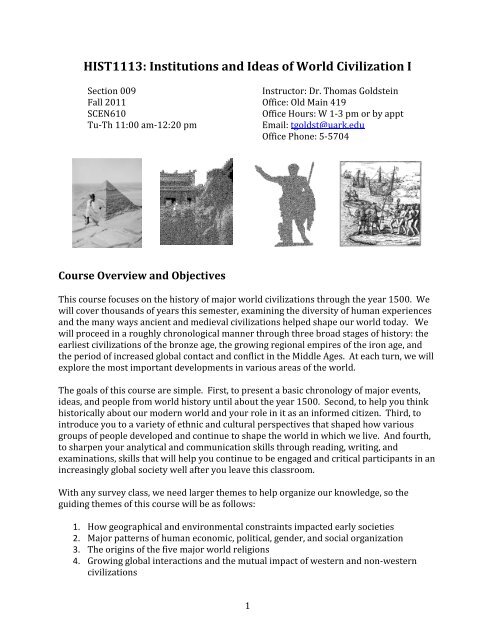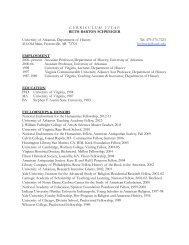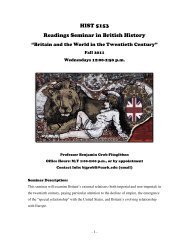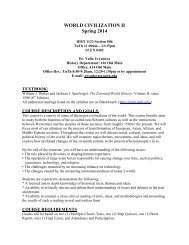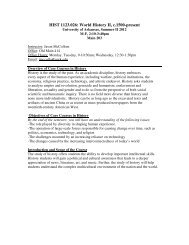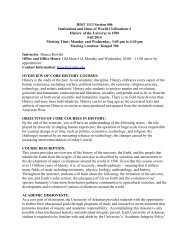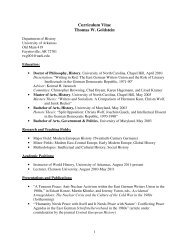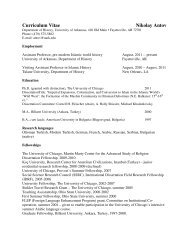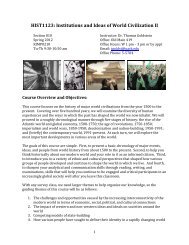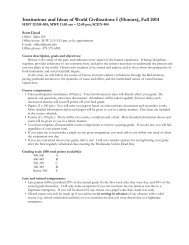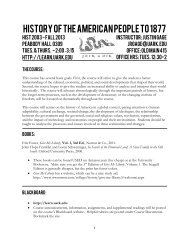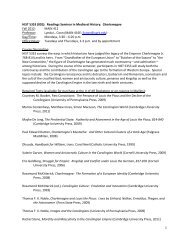HIST1113: Institutions and Ideas of World Civilization I - History
HIST1113: Institutions and Ideas of World Civilization I - History
HIST1113: Institutions and Ideas of World Civilization I - History
You also want an ePaper? Increase the reach of your titles
YUMPU automatically turns print PDFs into web optimized ePapers that Google loves.
<strong>HIST1113</strong>: <strong>Institutions</strong> <strong>and</strong> <strong>Ideas</strong> <strong>of</strong> <strong>World</strong> <strong>Civilization</strong> I<br />
Section 009<br />
Instructor: Dr. Thomas Goldstein<br />
Fall 2011 Office: Old Main 419<br />
SCEN610<br />
Office Hours: W 1-3 pm or by appt<br />
Tu-Th 11:00 am-12:20 pm<br />
Email: tgoldst@uark.edu<br />
Office Phone: 5-5704<br />
Course Overview <strong>and</strong> Objectives<br />
This course focuses on the history <strong>of</strong> major world civilizations through the year 1500. We<br />
will cover thous<strong>and</strong>s <strong>of</strong> years this semester, examining the diversity <strong>of</strong> human experiences<br />
<strong>and</strong> the many ways ancient <strong>and</strong> medieval civilizations helped shape our world today. We<br />
will proceed in a roughly chronological manner through three broad stages <strong>of</strong> history: the<br />
earliest civilizations <strong>of</strong> the bronze age, the growing regional empires <strong>of</strong> the iron age, <strong>and</strong><br />
the period <strong>of</strong> increased global contact <strong>and</strong> conflict in the Middle Ages. At each turn, we will<br />
explore the most important developments in various areas <strong>of</strong> the world.<br />
The goals <strong>of</strong> this course are simple. First, to present a basic chronology <strong>of</strong> major events,<br />
ideas, <strong>and</strong> people from world history until about the year 1500. Second, to help you think<br />
historically about our modern world <strong>and</strong> your role in it as an informed citizen. Third, to<br />
introduce you to a variety <strong>of</strong> ethnic <strong>and</strong> cultural perspectives that shaped how various<br />
groups <strong>of</strong> people developed <strong>and</strong> continue to shape the world in which we live. And fourth,<br />
to sharpen your analytical <strong>and</strong> communication skills through reading, writing, <strong>and</strong><br />
examinations, skills that will help you continue to be engaged <strong>and</strong> critical participants in an<br />
increasingly global society well after you leave this classroom.<br />
With any survey class, we need larger themes to help organize our knowledge, so the<br />
guiding themes <strong>of</strong> this course will be as follows:<br />
1. How geographical <strong>and</strong> environmental constraints impacted early societies<br />
2. Major patterns <strong>of</strong> human economic, political, gender, <strong>and</strong> social organization<br />
3. The origins <strong>of</strong> the five major world religions<br />
4. Growing global interactions <strong>and</strong> the mutual impact <strong>of</strong> western <strong>and</strong> non-western<br />
civilizations<br />
1
5. Humans’ search for a usable identity in a changing society <strong>and</strong> world<br />
Readings<br />
The following books are required for this course. They are available for purchase at the<br />
Arkansas campus bookstore. You may find these books cheaper online at any <strong>of</strong> a number<br />
<strong>of</strong> sites (e.g., half.com, abebooks.com, amazon.com), but it will likely take a week or more<br />
for the books to arrive (so order them soon).<br />
• Cullen Murphy, Are We Rome The Fall <strong>of</strong> an Empire <strong>and</strong> the Fate <strong>of</strong> America<br />
• Peter N. Stearns, ed., <strong>World</strong> <strong>History</strong> in Documents: A Comparative Reader, 2 nd edition<br />
• Jiu-Hwa L. Upshur et al., <strong>World</strong> <strong>History</strong>: Volume I – Before 1600: The Development <strong>of</strong><br />
Early <strong>Civilization</strong>s, 5 th edition<br />
There will be additional smaller readings available via our class blackboard website.<br />
NOTE: You are to complete the assigned reading by the beginning <strong>of</strong> class on the day on<br />
which it is listed in the schedule <strong>of</strong> classes below.<br />
Requirements <strong>and</strong> Grading<br />
Lectures:<br />
Much <strong>of</strong> the information you will receive will come from lectures. Information from<br />
lectures will be used in constructing the midterm <strong>and</strong> final <strong>and</strong> will also help “set the scene”<br />
for your readings <strong>and</strong> provide context to help you write your papers.<br />
Attendance:<br />
Attendance is required for this course. You may miss up to four classes for any reason<br />
without consequences, but beyond that, you will lose 2% <strong>of</strong>f your final exam grade for each<br />
additional absence. Also note that arriving late to class three times will be considered one<br />
unexcused absence. If you have perfect attendance for the semester, you will receive a 2%<br />
bonus on your final exam.<br />
If you need to miss a class for a legitimate reason (medical or otherwise), you must provide<br />
documentation as far in advance as possible. This means that if you miss class because you<br />
are feeling a little under the weather but do not have a doctor’s note, the absence will not be<br />
excused. In other words, you must document every absence if you want it to be excused.<br />
Response Papers:<br />
At five points during the semester, you must turn in a response paper addressing a specific<br />
question about two <strong>of</strong> the course readings. These papers should be 1-2 paragraphs in<br />
length. On one <strong>of</strong> these five occasions (<strong>of</strong> your choosing), in place <strong>of</strong> a short response paper<br />
you must write a 4-5-page paper <strong>of</strong>fering a more detailed answer to the question.<br />
Exams:<br />
2
There will be two exams in this course, each consisting <strong>of</strong> a mixture <strong>of</strong> term identifications,<br />
objective components, <strong>and</strong> essay questions. The questions will all be drawn from lecture<br />
<strong>and</strong> the course readings <strong>and</strong> will cover both larger themes <strong>and</strong> more specific details. An<br />
exam guide will be distributed one week prior to the exams to aid your studying.<br />
Grading:<br />
Short Response Papers (4) 15%<br />
Long Response Paper 25%<br />
Midterm 25%<br />
Final exam 35%<br />
Rules <strong>and</strong> Policies<br />
Blackboard Website:<br />
The primary means <strong>of</strong> communication <strong>and</strong> the distribution <strong>of</strong> information for this class will<br />
be through our course blackboard website. To this end, you should check our site regularly<br />
for updates, assignments, paper guides, <strong>and</strong> grades. If you are having difficulties accessing<br />
our class blackboard site, let me know ASAP.<br />
Laptops:<br />
Laptops will be permitted in this class but if they become a distraction for you or your<br />
fellow students, you will not be permitted to use them. In other words, don’t let me catch<br />
you playing Angry Birds on your iPad lest you want me to confiscate it so I can play Angry<br />
Birds (but only AFTER lecture).<br />
Classroom Behavior:<br />
You are expected to be in class on time, pay attention in lecture, turn <strong>of</strong>f your cell phone,<br />
<strong>and</strong> refrain from disruptive behavior (talking, surfing the internet, texting, eating loudly,<br />
passing notes, sleeping, reading the newspaper, practicing semaphore, etc.). Failure to do<br />
so could lead to you being asked to leave the classroom, which would mean an unexcused<br />
absence counted against your grade.<br />
Late assignments:<br />
Assignments are due at the beginning <strong>of</strong> class on the day listed below in the course<br />
schedule. I will accept late assignments, but out <strong>of</strong> fairness to the other students who<br />
meet the deadlines, your paper will be graded down by half a letter grade (for example<br />
from 85 to 80) for every twenty-four-hour period for which it is late. Computer failure,<br />
printer jams, or limited computer access are not legitimate excuses for late assignments.<br />
Communication:<br />
E-mail is an efficient, reliable, <strong>and</strong> useful form <strong>of</strong> communication, but it is also a highly<br />
impersonal way <strong>of</strong> getting in touch with someone. For pr<strong>of</strong>essional correspondences, it is<br />
important that you personalize an e-mail message as much as you can in order for it to<br />
come across as polite, courteous, <strong>and</strong> pr<strong>of</strong>essional. One <strong>of</strong> the best ways is to make sure<br />
that you address an e-mail like you would a normal letter; use “Dear Dr. Goldstein,” or “Hi<br />
3
Dr. Goldstein,” before you begin the rest <strong>of</strong> your e-mail. End it by saying “Thanks, The<br />
Situation” or “Best regards, Snooki.” These little touches, so easy to do but so <strong>of</strong>ten<br />
forgotten in the rush to press “send,” go a long way to making your e-mails much more<br />
pleasant, personal, <strong>and</strong> courteous.<br />
More generally, communication with the instructor is expected in any situation that may<br />
affect your ability to fulfill course requirements. All such communication is the<br />
responsibility <strong>of</strong> the student.<br />
Outside Sources for the Response Papers:<br />
Outside sources such as wikipedia, spark notes, or any other online or printed work are<br />
forbidden for your response papers. The papers iare designed to test your ability to think<br />
analytically <strong>and</strong> creatively about our course readings <strong>and</strong> other primary sources <strong>and</strong> hence<br />
relying on someone else’s interpretation defeats the entire purpose <strong>of</strong> the assignment <strong>and</strong>,<br />
more seriously, could constitute a violation <strong>of</strong> Arkansas’s academic integrity policy.<br />
Plagiarism:<br />
Plagiarism is the intentional or unintentional use <strong>of</strong> someone else’s words or ideas without<br />
explicitly citing it as such. It is strictly prohibited at Arkansas <strong>and</strong> is something I take very<br />
seriously. Besides, it usually takes more effort to plagiarize than to do the assignment<br />
honestly, so it’s not worth risking your academic career for an assignment worth only a<br />
small percentage <strong>of</strong> your grade. If you are caught plagiarizing on any <strong>of</strong> your assignments, I<br />
am required to report it, so don’t do it.<br />
Seriously – don’t.<br />
If you are unsure what constitutes plagiarism, see Arkansas’s guide to paper citation:<br />
http://libinfo.uark.edu/reference/citingyoursources.asp.<br />
Schedule <strong>of</strong> Classes<br />
* Reading available via the course blackboard site<br />
Part I: The Origins <strong>of</strong> <strong>Civilization</strong><br />
Week 1<br />
8/23 Course Introduction: What is “<strong>Civilization</strong>”<br />
8/25 Early River-Valley <strong>Civilization</strong>s: Mesopotamia <strong>and</strong> Africa<br />
Read: “The Epic <strong>of</strong> Gilgamesh”*; Upshur et al., <strong>World</strong> <strong>History</strong>, 1-33<br />
Week 2<br />
8/30 Early River-Valley <strong>Civilization</strong>s: China, India, <strong>and</strong> Mesoamerica<br />
Read: “The Ramayana <strong>of</strong> Valmiki”*; Upshur, 33-53<br />
9/1 The Origins <strong>of</strong> Monotheism: Zoroastrians <strong>and</strong> Hebrews<br />
Read: Upshur, 98-106<br />
4
Week 3<br />
9/6 Discussion: Creation Stories <strong>and</strong> Ancient Laws<br />
Read: Stearns, <strong>World</strong> <strong>History</strong> in Documents, 14-33; “Theogeny”*<br />
Response Paper #1 Due<br />
Part II: Ancient Empires<br />
9/8 Classical Greece: Society, Culture, <strong>and</strong> Philosophy<br />
Read: Upshur, 106-123<br />
Week 4<br />
9/13 Classical Greece: War <strong>and</strong> Decline<br />
Read: Stearns, 38-40<br />
9/15 Ancient India: The Origins <strong>of</strong> Hinduism <strong>and</strong> Buddhism<br />
Read: Ushur, 56-74, 123-132, 185-200<br />
Week 5<br />
9/20 Ancient China: Confucianism, Taoism, <strong>and</strong> the Stirrings <strong>of</strong> Empire<br />
Read: Stearns, 36-38; Upshur, 74-94, 132-147<br />
9/22 No Class: Dr. Goldstein has a conference<br />
Week 6<br />
9/27 The Hellenistic Kingdoms: The First Global <strong>Civilization</strong><br />
Read: Excerpt from Epictetus, “The H<strong>and</strong>book”*; Upshur, 154-167<br />
9/29 The Rise <strong>of</strong> Rome <strong>and</strong> Fall <strong>of</strong> the Republic<br />
Read: Website on Gladiatorial Games*; Upshur, 167-177<br />
Week 7<br />
10/4 Discussion: Ancient <strong>World</strong> Comparisons<br />
Read: Stearns, 41-67<br />
Response Paper #2 Due<br />
10/6 The Origins <strong>and</strong> Expansion <strong>of</strong> Christianity<br />
Read: Stearns, 74-78; Upshur, 221-233<br />
Week 8<br />
10/11 Midterm<br />
10/13 “Barbarian” Invasions <strong>and</strong> the Decline (<strong>and</strong> Fall) <strong>of</strong> Rome<br />
Read: Upshur, 177-185, 262-270<br />
Week 9<br />
10/18 No Class: Fall Break<br />
10/20 Discussion: America <strong>and</strong> Rome<br />
Read: Murphy, Are We Rome, introduction, chapters 2, 3, 5, epilogue<br />
Response Paper #3 Due<br />
5
Week 10<br />
10/25 The Rise <strong>of</strong> Islam<br />
Read: “The Pact <strong>of</strong> Umar”*; Upshur, 270-279<br />
10/27 Imperial China<br />
Read: Upshur, 200-214, 305-330<br />
Part III: The Middle Ages<br />
Week 11<br />
11/1 The Medieval African Empires<br />
Read: Stearns, 150-153; Upshur, 369-387<br />
11/3 The Advent <strong>of</strong> Feudalism in Europe<br />
Read: Stearns, 102-105; Upshur, 233-262<br />
Week 12<br />
11/8 The Crusades<br />
11/10 Discussion: Medieval Religious Customs <strong>and</strong> Warfare in Christianity <strong>and</strong> Islam<br />
Read: Stearns, 82-99, 111-120<br />
Response Paper #4 Due<br />
Week 13<br />
11/15 The Mongol Conquests<br />
Read: Stearns, 138-41; Upshur, 395-444<br />
11/17 Asia in the Middle Ages<br />
Read: Stearns, 106-110, 286-305, 335-346<br />
Week 14<br />
11/22 The Ottoman Empire Between <strong>World</strong>s<br />
Read: Upshur, 451-463<br />
11/24 No Class: Thanksgiving<br />
Week 15<br />
11/29 The European Renaissance<br />
Read: Upshur, 463-474<br />
12/1 <strong>World</strong>s Colliding: The “Discovery” <strong>of</strong> the New <strong>World</strong><br />
Read: Upshur, 491-506<br />
Week 16<br />
12/6 Discussion: The Columbian Encounter<br />
Read: Stearns, 161-189<br />
Response Paper #5 Due<br />
12/8 The <strong>World</strong> in 1500<br />
Final Exam: Tuesday 12/13 10:15-12:15 am<br />
6


